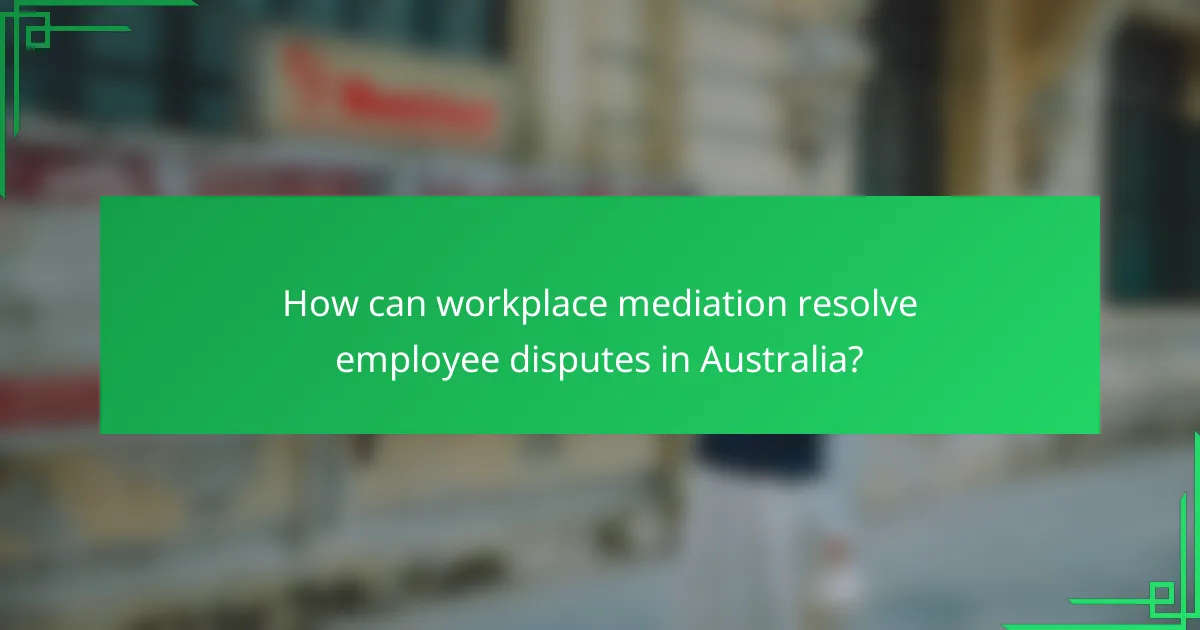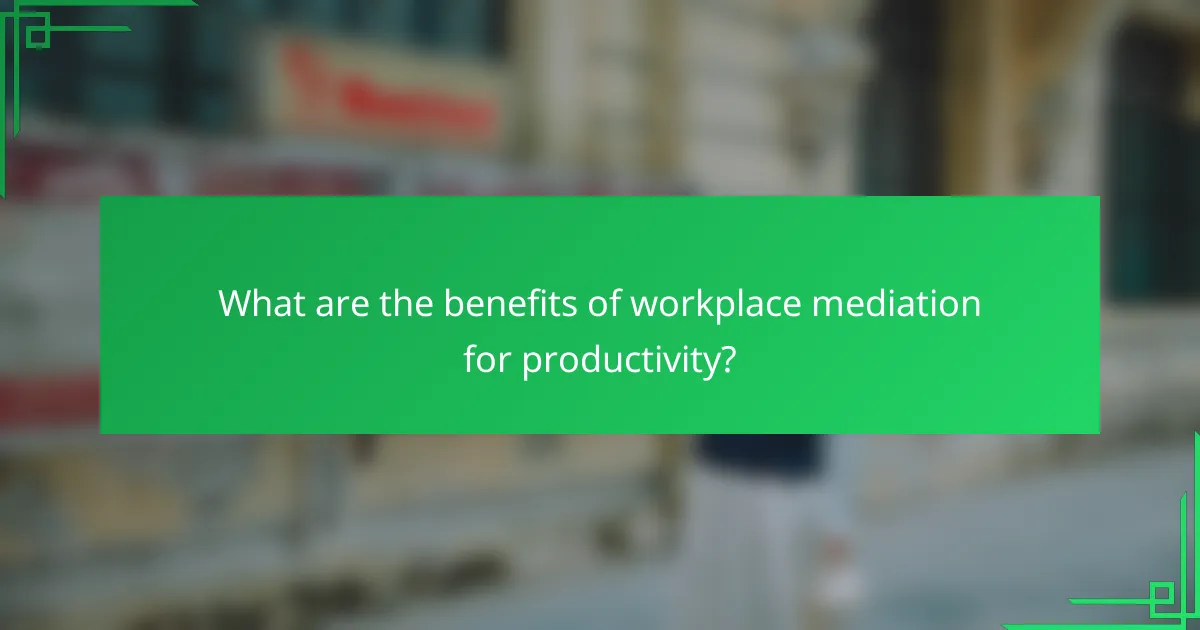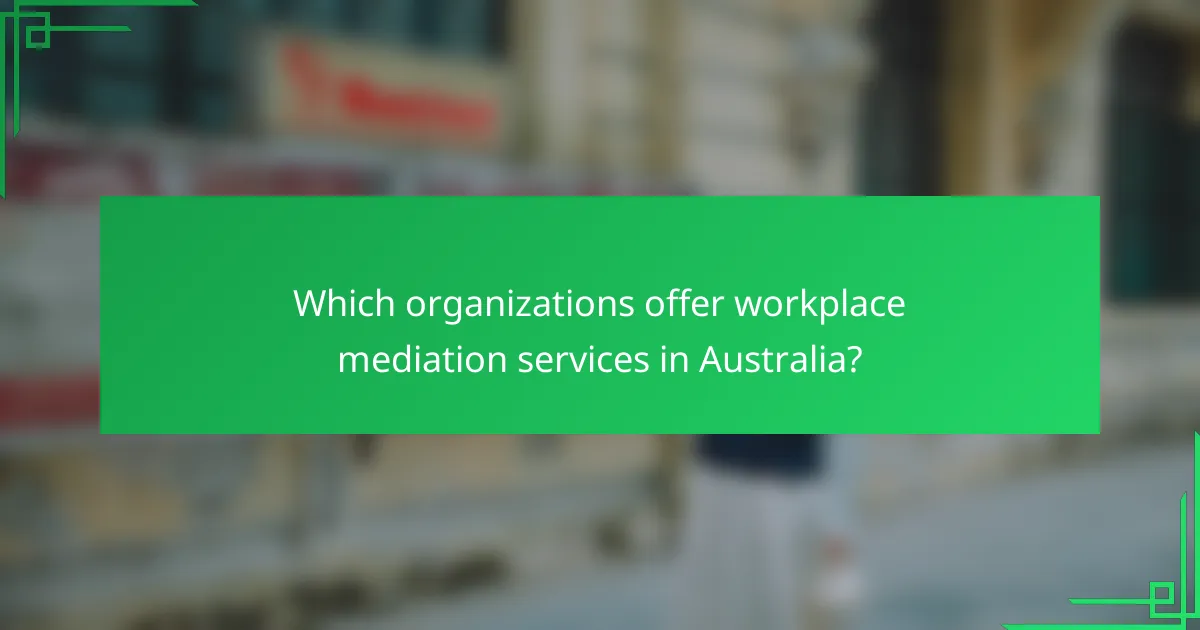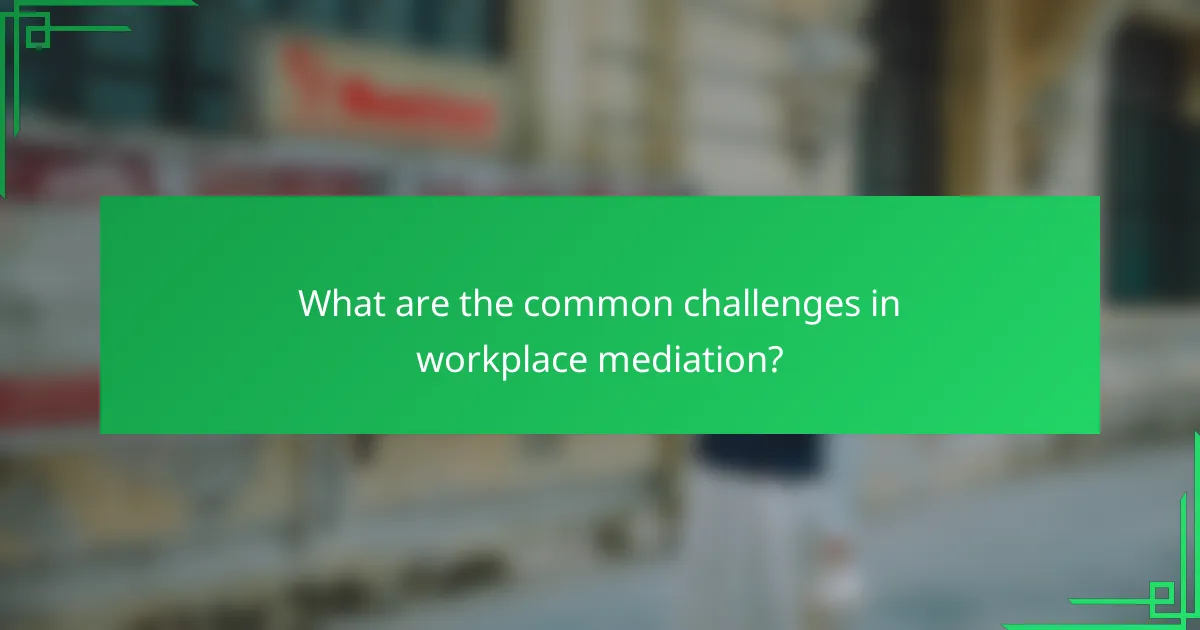Workplace mediation serves as a vital tool for resolving employee disputes, promoting open dialogue and mutual understanding. By addressing conflicts promptly, it not only enhances productivity but also ensures confidentiality, creating a safe environment for honest communication and effective resolution.

How can workplace mediation resolve employee disputes in Australia?
Workplace mediation in Australia effectively addresses employee disputes by fostering open dialogue and promoting mutual understanding. This process not only helps to resolve conflicts but also enhances overall productivity and maintains confidentiality throughout the discussions.
Facilitated communication
Facilitated communication is a key component of workplace mediation, allowing employees to express their concerns in a structured environment. Mediators guide the conversation, ensuring that all parties have the opportunity to speak and be heard, which can lead to a clearer understanding of the issues at hand.
By encouraging honest dialogue, facilitated communication helps to break down barriers and can lead to quicker resolutions. It is important for employees to feel safe in sharing their thoughts, which is why confidentiality is a crucial aspect of this process.
Neutral third-party involvement
The involvement of a neutral third party is essential in workplace mediation, as it ensures that the process remains unbiased and fair. Mediators are trained professionals who do not take sides, allowing them to facilitate discussions without any personal stake in the outcome.
This neutrality helps to create a safe space for employees to discuss their grievances openly. It also reassures participants that the mediation process is focused on finding a resolution rather than assigning blame.
Structured negotiation process
A structured negotiation process is vital for effective workplace mediation, as it provides a clear framework for discussions. This process typically involves identifying the issues, exploring possible solutions, and agreeing on actionable steps to resolve the conflict.
By following a structured approach, mediators can help employees stay focused on the issues rather than getting sidetracked by emotions. This clarity can lead to more productive outcomes and a higher likelihood of agreement.
Conflict resolution training
Conflict resolution training equips employees with the skills needed to manage disputes proactively. By learning techniques for effective communication and negotiation, employees can address issues before they escalate into larger conflicts.
Organizations in Australia often benefit from providing this training, as it fosters a culture of collaboration and understanding. Investing in conflict resolution training can lead to a more harmonious workplace and reduce the frequency of disputes.

What are the benefits of workplace mediation for productivity?
Workplace mediation significantly enhances productivity by resolving employee disputes efficiently and fostering a collaborative environment. By addressing conflicts early, organizations can maintain focus on work and reduce disruptions that hinder performance.
Improved employee morale
Mediation helps improve employee morale by creating a safe space for open communication. When employees feel heard and valued, their job satisfaction increases, leading to a more positive workplace atmosphere.
For instance, resolving conflicts through mediation can prevent resentment from building up, which often leads to disengagement. A happier workforce is typically more motivated and productive.
Reduced absenteeism
Effective mediation can lead to reduced absenteeism by addressing the root causes of workplace conflicts. When disputes are resolved amicably, employees are less likely to take time off due to stress or dissatisfaction.
Organizations that implement mediation strategies often see a decline in absentee rates, as employees feel more connected and committed to their work environment. This can translate to significant cost savings for businesses.
Enhanced teamwork
Workplace mediation fosters enhanced teamwork by encouraging collaboration and understanding among employees. By resolving disputes, mediation helps build trust and respect, essential components of effective teamwork.
Teams that engage in mediation are often more cohesive, as members learn to communicate better and appreciate diverse perspectives. This improved collaboration can lead to innovative solutions and higher overall productivity.

How does confidentiality work in workplace mediation?
Confidentiality in workplace mediation ensures that discussions and agreements remain private, fostering a safe environment for open communication. This protection is crucial for encouraging honest dialogue and resolving disputes without fear of repercussions.
Non-disclosure agreements
Non-disclosure agreements (NDAs) are legal contracts that prevent parties from sharing information discussed during mediation. These agreements help establish trust and ensure that sensitive details remain confidential, which is vital for effective resolution. Organizations often require NDAs to protect proprietary information and maintain workplace harmony.
Private sessions
Private sessions during mediation allow participants to speak freely without outside influence or judgment. These one-on-one discussions can help clarify issues and promote understanding. Keeping sessions private also reinforces the confidentiality of the mediation process, encouraging honest communication.
Trust-building measures
Trust-building measures are essential for creating a safe mediation environment. Techniques such as active listening, empathy, and establishing ground rules can enhance trust among participants. When employees feel secure, they are more likely to engage openly, leading to more effective dispute resolution.

What are the prerequisites for effective workplace mediation?
Effective workplace mediation requires a commitment from all parties involved and a structured approach to the process. Key prerequisites include a willingness to participate and clear mediation guidelines to ensure a productive environment.
Willingness to participate
For mediation to be successful, all participants must be open to engaging in the process. This willingness fosters a collaborative atmosphere where individuals feel safe to express their concerns and work towards resolution.
Encouraging a positive mindset can be achieved through pre-mediation discussions that emphasize the benefits of resolving disputes amicably. It’s essential to address any fears or misconceptions about mediation to enhance participation.
Clear mediation guidelines
Establishing clear guidelines for the mediation process is crucial for maintaining focus and structure. These guidelines should outline the roles of the mediator, the expected behavior of participants, and the confidentiality of discussions.
Providing a written framework can help set expectations and reduce anxiety. Key elements might include time limits for speaking, rules against interruptions, and the importance of active listening. This clarity ensures that all parties understand the process and feel respected throughout.

Which organizations offer workplace mediation services in Australia?
In Australia, several organizations specialize in workplace mediation services, helping to resolve employee disputes effectively. These organizations provide trained mediators who facilitate discussions between conflicting parties to enhance productivity and maintain confidentiality.
Resolution Institute
Resolution Institute is a prominent organization in Australia that offers workplace mediation services. They provide a range of mediation options tailored to the specific needs of businesses, ensuring that disputes are resolved efficiently and amicably.
When engaging with Resolution Institute, organizations can expect a structured process that includes initial assessments, mediation sessions, and follow-up support. Their mediators are experienced professionals who adhere to industry standards, ensuring confidentiality and professionalism throughout the mediation process.
Australian Mediation Association
The Australian Mediation Association (AMA) is another key player in the field of workplace mediation. They focus on promoting best practices in mediation and offer resources for both mediators and organizations seeking mediation services.
AMA provides access to a network of qualified mediators who specialize in workplace disputes. Their approach emphasizes collaborative problem-solving, which can lead to improved relationships and enhanced workplace productivity. Organizations are encouraged to consider the AMA for their mediation needs to benefit from their expertise and commitment to confidentiality.

What are the common challenges in workplace mediation?
Workplace mediation often faces several challenges that can hinder its effectiveness. Key issues include resistance from employees, lack of trust in the process, and difficulties in communication between parties.
Resistance from employees
Resistance from employees is a significant challenge in workplace mediation. Employees may feel skeptical about the mediation process, fearing that it could lead to negative consequences or that their concerns won’t be adequately addressed.
To address this resistance, it’s crucial to foster an environment of trust and openness. Providing clear information about the mediation process and its benefits can help alleviate fears. For example, sharing success stories from previous mediations can encourage participation.
Employers should also ensure confidentiality throughout the mediation process. Emphasizing that discussions will remain private can help employees feel more secure in expressing their concerns. This assurance can significantly reduce resistance and enhance overall engagement in the mediation process.
